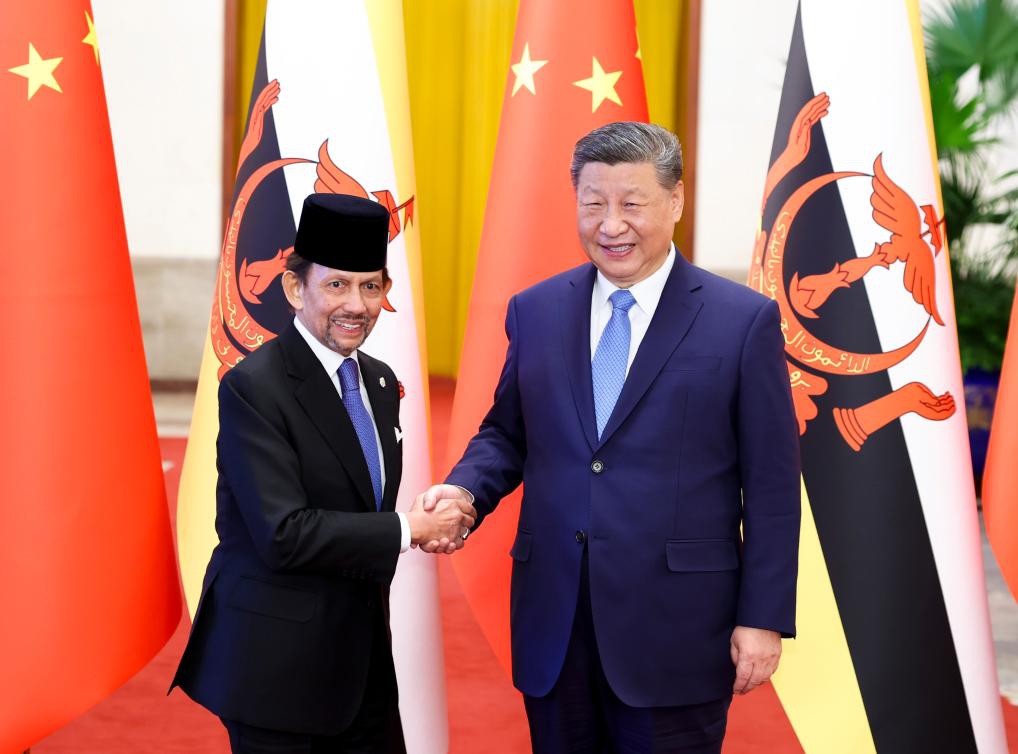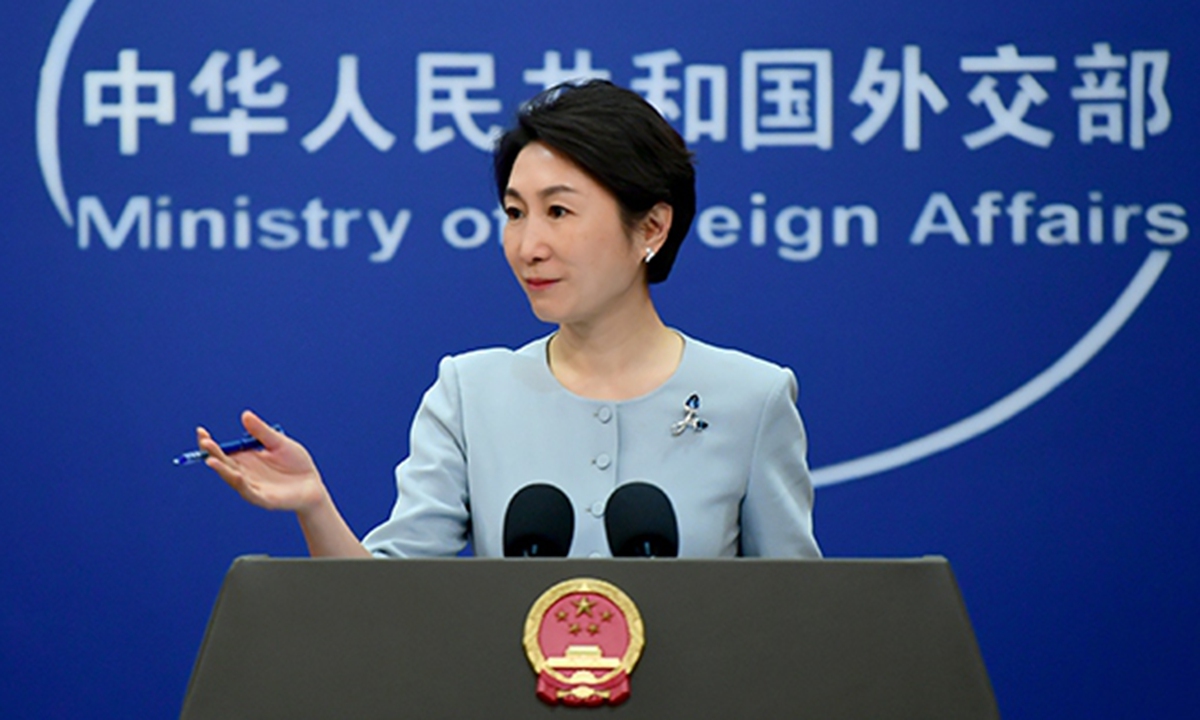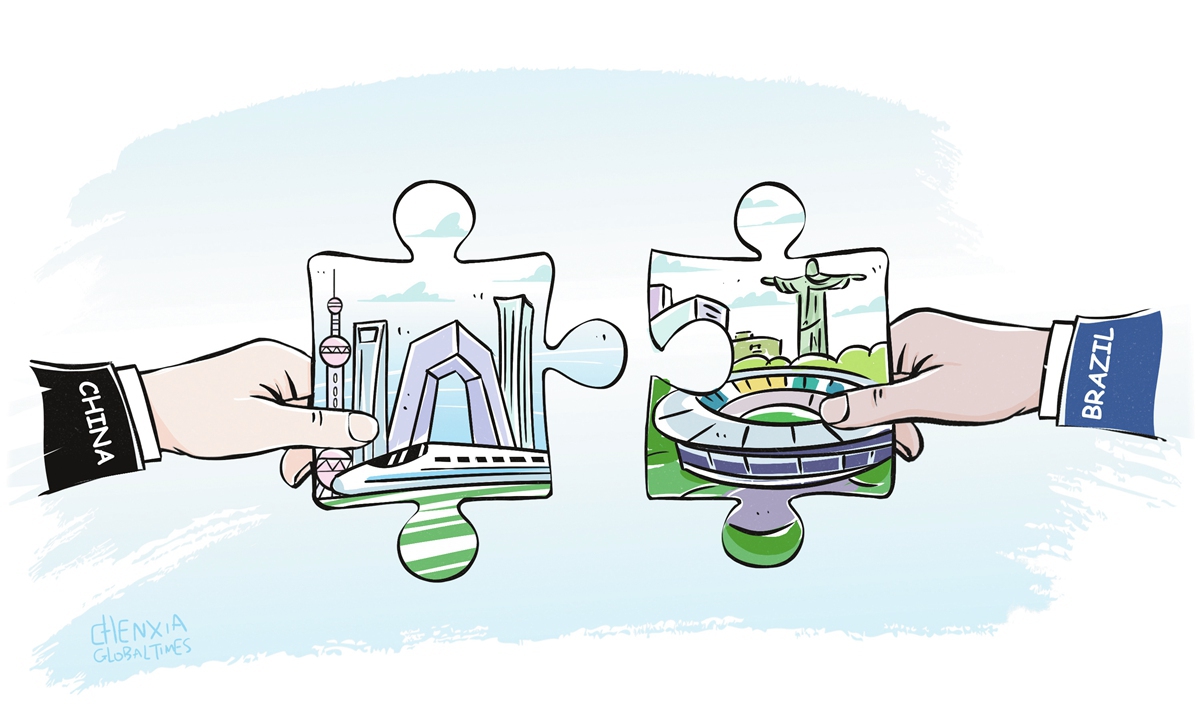
Chinese President Xi Jinping meets with Prime Minister of Thailand Paetongtarn Shinawatra, who is on an official visit to China, at the Great Hall of the People in Beijing, capital of China, Feb. 6, 2025. (Xinhua/Liu Weibing)

Chinese President Xi Jinping shakes hands with Sultan of Brunei Haji Hassanal Bolkiah Mu'izzaddin Waddaulah at the Great Hall of the People in Beijing, capital of China, Feb. 6, 2025. Xi held talks with Hassanal, who is on a state visit to China, in Beijing on Thursday. (Xinhua/Huang Jingwen)
One day after meeting and having talks with visiting Kyrgyz President Sadyr Japarov and Pakistani President Asif Ali Zardari in Beijing on Wednesday, Chinese President Xi Jinping met with Prime Minister of Thailand Paetongtarn Shinawatra and Sultan of Brunei Haji Hassanal Bolkiah Mu'izzaddin Waddaulah in Beijing on Thursday, continuing his busy schedule after the Spring Festival holidays.
When meeting with Paetongtarn who is paying an official visit to China from February 5 to 8, Xi said that this year marks the 50th anniversary of China-Thailand diplomatic relations as well as the "Golden Jubilee of China-Thailand Friendship." The two sides should build on past achievements and work together to advance the building of the China-Thailand community with a shared future to deliver more benefits to the two peoples, the region and the world at large, according to Xinhua.
In the face of profound changes unseen in a century, China and Thailand should consolidate strategic mutual trust, firmly support each other, and respond to uncertainties in the external environment with the stability and certainty of China-Thailand relations, Xi said.
Paetongtarn said she is delighted to visit China at a time when the two countries are celebrating the "golden jubilee" of their friendship. Thailand and China have forged a special friendly and cooperative relationship over the past five decades.
Calling China a responsible major country in international affairs that firmly safeguards the interests of developing nations, Paetongtarn said Thailand is willing to strengthen coordination and collaboration with China to address global challenges.
While meeting with Brunei's Sultan Hassanal who is paying a state visit to China from February 5 to 7, President Xi said that since the establishment of diplomatic ties more than 30 years ago, the two countries have continuously deepened political mutual trust, actively aligned development strategies, and achieved fruitful results in practical cooperation in various fields, Xinhua reported.
The two countries have also maintained good coordination in international and regional affairs, set an example of relationship between countries of different sizes, which features equality and mutual benefit, and made positive contributions to regional peace, stability, development and prosperity, he added.
Xi said the joint building of a China-Brunei community with a shared future conforms to the trend of the times, serves the fundamental interests of the two countries and two peoples, and opens a new chapter in bilateral relations.
Hassanal spoke highly of China's remarkable achievements in maintaining sustained and rapid economic growth and lifting hundreds of millions of people out of poverty.
He said the three major global initiatives proposed by China are playing a key role in promoting world peace, stability and development, which demonstrates China's sense of responsibility as a major country.
The visits of the leaders from Thailand and Brunei to China during the Spring Festival are as natural as relatives paying each other visits, and are a diplomatic gesture that reflects warmth and closeness of ties, Zhou Shixin, director of the Institute for Foreign Policy Studies at the Shanghai Institute for International Studies, told the Global Times on Thursday.
Such visits will further promote bilateral ties, and both China-Thailand and China-Brunei relations reflect China's commitment to fostering friendly and cooperative ties with ASEAN countries, highlighting its willingness to build strong partnerships with all ASEAN members, said Zhou.
President Xi will attend the opening ceremony of the 9th Asian Winter Games on Friday in Harbin, Heilongjiang Province. He will also host a welcome banquet for visiting foreign leaders attending the opening ceremony, including Sultan of Brunei Haji Hassanal Bolkiah Mu'izzaddin Waddaulah, Kyrgyz President Sadyr Japarov, Pakistani President Asif Ali Zardari, Prime Minister of Thailand Paetongtarn Shinawatra, and National Assembly Speaker of the Republic of Korea Woo Won-shik, according to Xinhua.
Strengthening ties
When meeting with Paetongtarn, Xi said that China is ready to work with Thailand to align development strategies, expand mutually beneficial cooperation, implement well flagship projects such as the China-Thailand Railway, and promote the vision of interconnected development of China, Laos and Thailand to achieve more fruitful outcomes as soon as possible.
Noting that China appreciates Thailand's effective measures against online gambling and telecom fraud, Xi said that both sides should continue to strengthen law enforcement, security and judicial cooperation to safeguard the safety of people's lives and property as well as the orderly exchanges and cooperation among regional countries.
"The prime minister of Thailand has the Chinese blood in her, I guarantee that it's gonna be very safe for Chinese people as well," said Paetongtarn during an interview with Chinese media on Thursday. Paetongtarn said that Thai people always come to China and they feel like home, so she hopes that Chinese people can come to Thailand and feel like home as well.
Thailand's decision to halt supplies to Myanmar's border areas demonstrates its commitment to combating telecom fraud. Enhanced cooperation among concerned nations is crucial to effectively addressing these issues, said Zhou.
Regarding the China-Thailand Railway, Zhou said that it will be a key transportation link between the two nations. Once completed, it will connect with the China-Laos Railway, forming the central route of the trans-Asian railway network. This corridor will enhance connectivity between China and Thailand and other ASEAN countries, laying the foundation for regional cooperation and boosting trade and economic integration across Southeast Asia.
Thailand aspires to achieve enhanced stability in its development trajectory, with China playing a pivotal role as a global stabilizer and a crucial partner in this endeavor. By fortifying its relationship with China, Thailand is committed to advancing a China-Thailand community with shared future, thereby securing greater prosperity and benefits for both nations and their citizens, said Zhou.
The stability of China-Thailand relations offers key insights for global and regional stability. Their cooperation drives mutual economic, political, and social development while strengthening bilateral and regional ties, said the expert.
Also on Thursday, China and Brunei Darussalam issued a joint statement on advancing the strategic cooperative partnership towards a China-Brunei community with a shared future, according to Xinhua.
According to the joint statement, Brunei expressed appreciation to China for extending a unilateral 30-day visa-free policy for ordinary passport holders. China welcomed Brunei Darussalam's decision to extend a 14-day visa waiver exemption for Chinese ordinary passport holders. Both sides expressed confidence that these visa waiver arrangements will continue to deepen and facilitate the people-to-people exchanges in tourism, culture, business, education, transport, health, sports development and infrastructure, and sister-city relationships.
It noted that China reaffirmed its strong support for Brunei Darussalam's economic diversification efforts, particularly towards the successful realization of Wawasan 2035. It also mentioned that both sides will further synergize development strategies and deepen high-quality Belt and Road cooperation, by strengthening economic partnerships, including through the Brunei-Guangxi Economic Corridor and promoting quality foreign direct investments (FDI) in key sectors such as food, downstream oil and gas, tourism, services and info-communications technology (ICT).
This joint statement will provide a new framework for advancing bilateral relations, taking cooperation between the two countries to a higher level, Ge Hongliang, deputy director of the College of ASEAN Studies at Guangxi University for Nationalities, told the Global Times.
Brunei's Wawasan 2035 vision focuses on industrial diversification, and in recent years, the country has strengthened ties with China in pursuit of this goal. The Sultan's visit and signed agreements will boost cooperation, particularly in diversification. As regional and global dynamics evolve, the two countries will explore new opportunities in diversified industries and emerging sectors, injecting fresh momentum into their partnership, said Ge.
Ge said that in the current regional context, China-ASEAN relations, including those with Thailand and Brunei, emphasize resilience beyond building a shared future and the Belt and Road Initiative. Facing major power competition, protectionism, and tariffs from the US and the West, ASEAN nations must deepen industrial cooperation with China, which is crucial for regional stability.
 Finland: 75th anniversary of the establishment of bilateral relations marked at new book release
Finland: 75th anniversary of the establishment of bilateral relations marked at new book release US relaxing travel advisory for China is beneficial for normal exchanges: Chinese FM
US relaxing travel advisory for China is beneficial for normal exchanges: Chinese FM GT Voice: Spillover risks of $36 trillion US debt necessitate global vigilance
GT Voice: Spillover risks of $36 trillion US debt necessitate global vigilance Brazilian ore, Chinese ingenuity craft green future for global trade
Brazilian ore, Chinese ingenuity craft green future for global trade